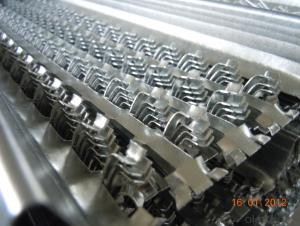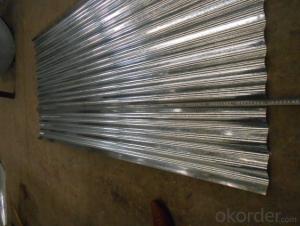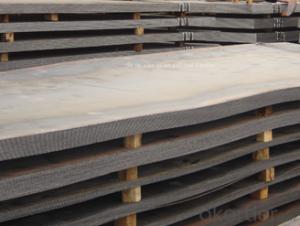STEEL RIB LATH
- Loading Port:
- China Main Port
- Payment Terms:
- TT OR LC
- Min Order Qty:
- -
- Supply Capability:
- -
OKorder Service Pledge
OKorder Financial Service
You Might Also Like
STEEL RIB lath
ZINC COATING: G40
WEIGHT PER ROLL: 4.6KG/SHEET
It is used in construction, is made of hot-dip zinc coated steel sheet.
It is used to be the material of untake out formwork for concret, widely used as plaster backing on ceilings, walls and stud partitions. Rib Lath is also ideal for refurbishing damaged or aged masonry walls when a key for rendering is not certain due to disintegration or softening of the wall face.
Construction formwork mesh has very good engineering quality and construction security;
Construction formwork mesh as the concrete permanent assembly
free sheet is much convenient for engineering design and processing;
Construction formwork mesh is widely used in tunnels,bridges and valve system and so on to make the process of construction much more fast and stable.
An integrally ribbed expanded metal lath used for exernal rendering in sheltered/moderate exposure away from the coast.
- Q:What are the different sheet metal stamping techniques for steel sheets?
- There are several sheet metal stamping techniques for steel sheets, including blanking, piercing, bending, deep drawing, and embossing.
- Q:Are steel sheets available in different patterns or textures?
- Yes, steel sheets are available in different patterns and textures.
- Q:What is the difference between hot-rolled and cold-rolled steel sheets?
- The main difference between hot-rolled and cold-rolled steel sheets lies in their production process. Hot-rolled steel sheets are made by heating the steel above its recrystallization temperature and then rolling it into its final shape, resulting in a rougher surface texture. On the other hand, cold-rolled steel sheets are processed at room temperature, which allows for tighter control over the dimensions and a smoother surface finish. Cold-rolled steel sheets also tend to have higher strength and better formability compared to hot-rolled sheets.
- Q:Can steel sheets be used for solar panel manufacturing?
- Solar panel manufacturing can utilize steel sheets. Steel is a versatile material widely used in various industries, including renewable energy. It offers several advantages for manufacturing solar panels. To begin with, steel is a strong and durable material that provides structural integrity to solar panels. It can withstand harsh weather conditions and protect the delicate photovoltaic (PV) cells within the panels. This durability ensures longer lifespan for the panels, reducing maintenance and replacement costs. Additionally, steel sheets can be easily shaped and sized to meet the specific requirements of solar panel designs. This flexibility in manufacturing allows for the creation of efficient and visually appealing solar panels. Moreover, steel is a cost-effective option compared to alternatives such as aluminum or glass. It is readily available and has relatively low production costs, making it an economical choice for solar panel manufacturing. Nevertheless, it is important to note that steel sheets used in solar panel manufacturing are typically coated with protective layers to enhance their resistance to corrosion and prevent any negative impact on the PV cells. These coatings safeguard the steel from environmental factors like moisture or chemicals, ensuring the longevity and performance of the solar panels. In conclusion, steel sheets are indeed suitable for solar panel manufacturing due to their durability, versatility, cost-effectiveness, and ease of fabrication. When appropriately coated, steel provides a dependable and efficient solution for producing solar panels, thereby contributing to the growth of the renewable energy sector.
- Q:What is the hardness of steel sheets?
- The hardness of steel sheets can vary depending on the specific type and grade of steel, but generally, steel sheets have a high level of hardness ranging from 30 to 60 on the Rockwell C scale.
- Q:How do steel sheets perform in low-temperature environments?
- Steel sheets generally perform well in low-temperature environments. The mechanical properties of steel, such as strength and toughness, are not significantly affected by low temperatures. Steel has a low coefficient of thermal expansion, which means it does not contract or expand drastically when subjected to temperature variations. This property allows steel sheets to maintain their shape and structural integrity in cold conditions. Moreover, steel is also highly resistant to brittle fracture at low temperatures. It has a good impact resistance, meaning it can absorb energy without fracturing. This makes steel sheets suitable for applications in low-temperature environments where materials need to withstand heavy loads or sudden impacts, such as in cold storage facilities or offshore structures in Arctic regions. However, it is worth noting that some types of steel, particularly those with high carbon content or low alloy steels, can exhibit reduced toughness and ductility at extremely low temperatures. In such cases, special precautions may be necessary, such as using steel grades specifically designed for low-temperature applications or implementing proper insulation measures to prevent rapid temperature changes. Overall, steel sheets are generally reliable and perform well in low-temperature environments due to their strength, toughness, and resistance to brittle fracture. However, the specific performance of steel in cold conditions may vary depending on the composition and quality of the steel used.
- Q:How do steel sheets perform in impact resistance?
- Steel sheets have excellent impact resistance due to their high strength and toughness. They are able to absorb and distribute the force exerted during an impact, minimizing deformation and damage.
- Q:Can steel sheets be formed into cylinders or tubes?
- Yes, steel sheets can be formed into cylinders or tubes through a process called tube or pipe rolling.
- Q:What are the different surface gloss levels available for steel sheets?
- The different surface gloss levels available for steel sheets include matte, satin, semi-gloss, and high gloss.
- Q:Are steel sheets suitable for manufacturing water pipes?
- Indeed, water pipes can be manufactured using steel sheets. Steel, being both durable and strong, possesses the ability to endure high pressure and corrosion, rendering it an optimal selection for water pipes. By skillfully molding and welding steel sheets, one can effortlessly produce seamless pipes that are impervious to leaks. Furthermore, steel pipes boast a lengthy lifespan and demand minimal upkeep, establishing themselves as an economically viable choice for water pipe production.
1. Manufacturer Overview |
|
|---|---|
| Location | |
| Year Established | |
| Annual Output Value | |
| Main Markets | |
| Company Certifications | |
2. Manufacturer Certificates |
|
|---|---|
| a) Certification Name | |
| Range | |
| Reference | |
| Validity Period | |
3. Manufacturer Capability |
|
|---|---|
| a)Trade Capacity | |
| Nearest Port | |
| Export Percentage | |
| No.of Employees in Trade Department | |
| Language Spoken: | |
| b)Factory Information | |
| Factory Size: | |
| No. of Production Lines | |
| Contract Manufacturing | |
| Product Price Range | |
Send your message to us
STEEL RIB LATH
- Loading Port:
- China Main Port
- Payment Terms:
- TT OR LC
- Min Order Qty:
- -
- Supply Capability:
- -
OKorder Service Pledge
OKorder Financial Service
Similar products
New products
Hot products
Related keywords






























